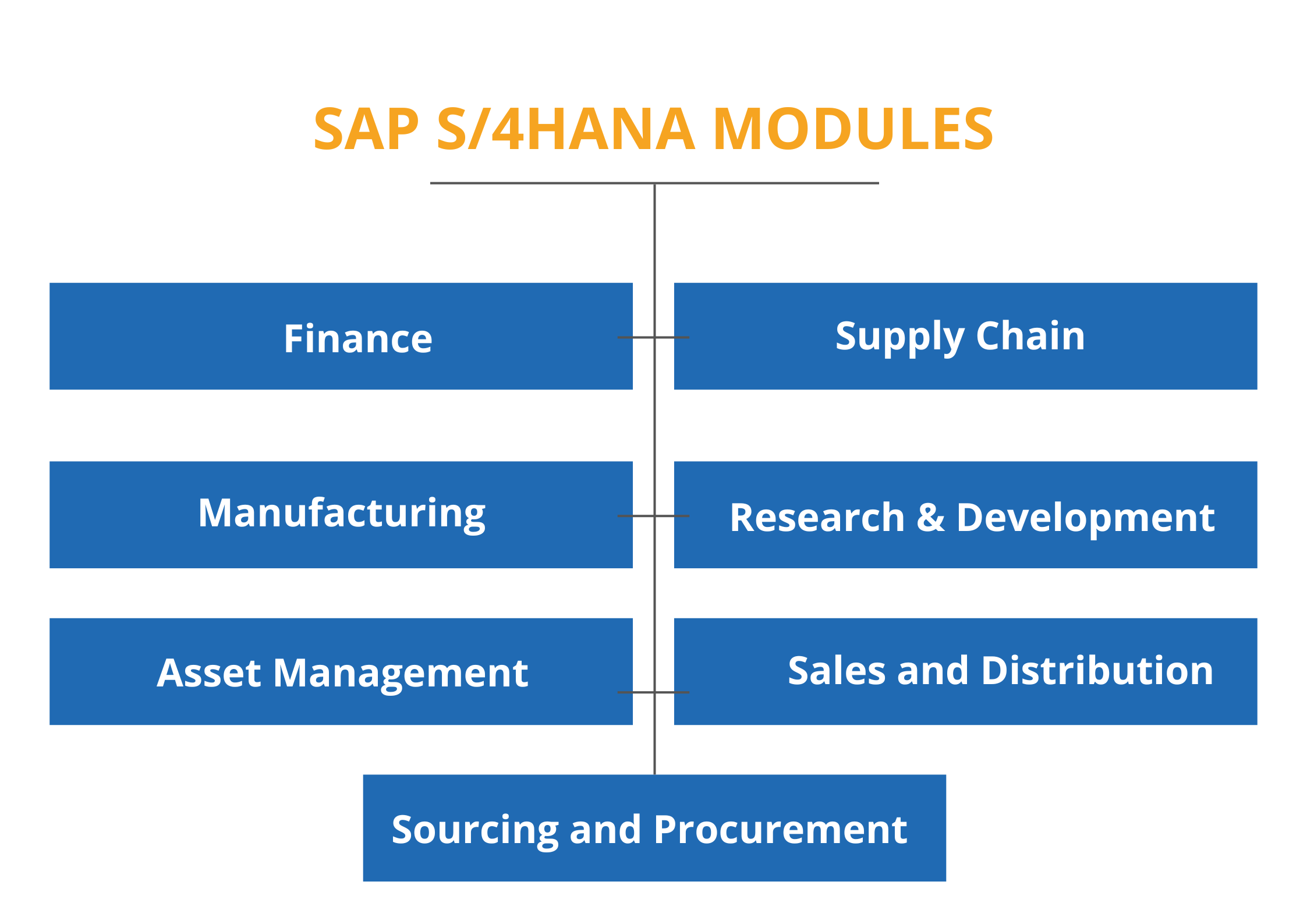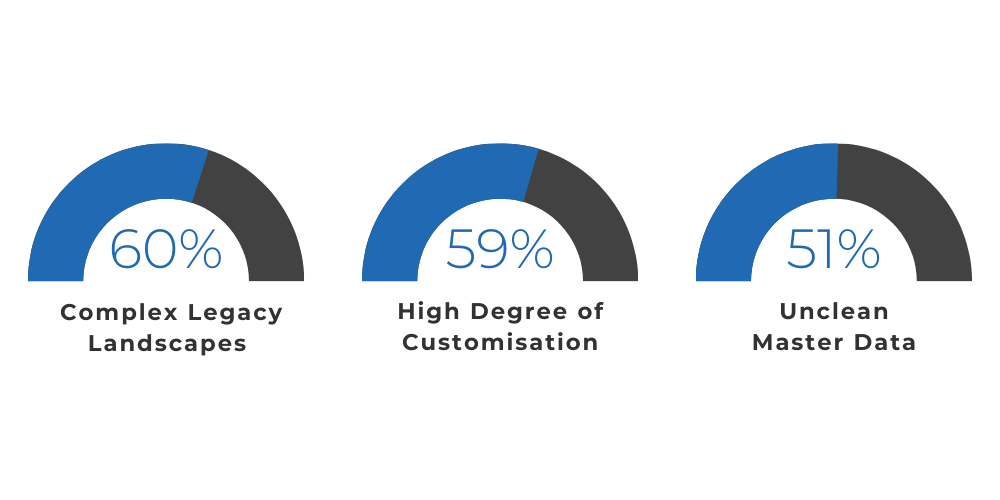What is SAP S/4HANA? Your Digital Transformation Guide
.jpg)
For businesses striving to thrive in the ever-evolving market, embracing SAP S/4HANA has become essential to maintaining competitiveness and driving growth.
According to a 2023 study by UKISUG, 92% of businesses are either utilising SAP S/4HANA (27%) or enthusiastically planning their migration (65%).
This surge highlights a clear industrial shift towards SAP's advanced Cloud ERP system and its role in enabling businesses to optimise operations, harness real-time insights, and innovate at scale.
However, moving to SAP S/4HANA is more than a technological upgrade—it's an opportunity to transform your existing systems, rethink processes, and position your organisation for a future-ready landscape.
In this blog, we'll explore "What is SAP S/4HANA?" in detail. Whether you're considering the move or actively planning your journey, this comprehensive guide will help you navigate the possibilities and challenges of SAP S/4HANA for your business.
What is SAP S/4HANA?
SAP S/4HANA is SAP's next-generation Cloud Enterprise Resource Planning (ERP) solution designed to simplify, streamline, and modernise business processes. Built on the SAP HANA in-memory database, it provides real-time insights, advanced analytics, and enhanced operational efficiency.
SAP S/4HANA stands for,
SAP: Systems, Applications, and Products in Data Processing.
S: Simple, reflecting its Streamlined Architecture.
4: The fourth generation of SAP's Business Suite.
HANA: Stands for High-Performance ANnalytic Appliance. It is a revolutionary in-memory database platform developed by SAP that enables real-time data processing and analysis.
SAP S/4HANA replaces SAP ERP Central Component (SAP ECC) and serves as the digital core for organisations aiming to integrate advanced technologies like AI, IoT, and Machine learning into their operations. With flexible deployment options across cloud, on-premise, and hybrid environments, SAP S/4HANA adapts to varying business needs.
Thinking about SAP S/4HANA migration?
Get a FREE SAP S/4HANA Migration Assessment and discover your best roadmap for a smooth and successful business transformation, today!
With expert guidance, you can minimise risk, optimise costs, and future-proof your business.
Features of SAP S/4HANA
Simplified Business Processes
- S/4HANA streamlines complex business processes by eliminating redundancies and automating tasks.
- This results in improved efficiency, fewer errors, and faster time-to-market.
Real-Time Insights
- S/4HANA's in-memory database enables instant access to critical business information.
- This enables organisations to make informed decisions quickly, respond to market changes proactively, and optimise their operations.
- Also, Integration with AI in S/4HANA enhances predictive planning and anomaly detection.
Enhanced User Experience
- The SAP Fiori interface provides an intuitive, role-based user experience.
- Simplified navigation and clean layouts make the system easy to understand and use, increasing productivity and thus reducing employees' learning curves.
Digital Core
- S/4HANA is an organisation's digital core, integrating seamlessly with other systems and technologies.
- It enables organisations to connect their entire value chain as a unified system and gain a holistic view of their business operations.
Data-Driven Decision-Making
- With advanced analytics and AI integration, S/4HANA empowers organisations to harness the full potential of their data.
- Businesses can uncover actionable insights, monitor performance metrics in real time, and make strategic decisions based on data-backed evidence rather than assumptions.
Cloud Advantage
- S/4HANA offers flexible deployment options, including public and private clouds, providing scalability and cost-efficiency.
- Cloud capabilities enable continuous innovation through regular updates, ensure high availability, and reduce IT infrastructure costs.
- This flexibility allows businesses to adapt quickly to changing market demands while benefiting from the latest advancements in ERP technology.
Industry-Specific Solutions
- S/4HANA offers industry-specific solutions tailored to the unique needs of various sectors, such as Manufacturing, Oil, Gas and Energy (OGE), Pharmaceuticals, Transportation and Logistics, Public Sector, and Healthcare.
- These solutions provide tailored functionalities and best practices to help businesses achieve their goals.
Why Migrate to SAP S/4HANA?
- 1
End of SAP ECC Support
SAP will end support for ECC in 2027 (standard support) and 2030 (extended support). It can also lead to security vulnerabilities, performance issues, and compliance risks. - 2
Competitive Advantage
Leveraging S/4HANA's capabilities give organisations a competitive edge. Also, Planning an early migration offers the advantage of a smooth and steady transition, avoiding rushed implementations. This proactive approach allows you to stay ahead by making faster, more informed decisions, streamlining operations, and consistently delivering exceptional customer experiences. - 3
Future-Proofing Your Business
S/4HANA is a next-generation cloud ERP designed to adapt to the evolving market and meet your customers' needs. It can integrate with emerging technologies like IoT, blockchain, ML and AI, ensuring your business remains relevant and sustainable in the future.
SAP S/4HANA Cloud Offerings: Public and Private Cloud Options
What is SAP S/4HANA Public Cloud?
The public cloud offering under GROW with SAP is tailored for organisations new to SAP ERP. It provides a standardised, ready-to-run ERP solution designed on industry best practices.
Key attributes of the public cloud option include:
- Minimal Customisation: Preconfigured processes ensure rapid deployment and alignment with industry norms.
- Automatic Updates: Continuous innovation is delivered seamlessly via regular updates, ensuring businesses consistently access the latest capabilities.
- Cost-Effective Scaling: The public cloud is ideal for small—to medium-sized businesses that want affordability and scalability without the complexities of managing infrastructure.
What is SAP S/4HANA Private Cloud?
The private cloud option under RISE with SAP is geared towards organisations with existing SAP systems or complex business needs.
It provides greater flexibility and control, including:
- Customisation and Integration: Businesses can retain and build upon previous configurations, workflows, and data integrations.
- Tailored Deployment: The private cloud provides unique solutions catering to specific organisational requirements.
- Dedicated Infrastructure: This option offers high control and enhanced security, making it suitable for enterprises in regulated industries or with critical data requirements.
SAP S/4HANa Deployment Options
There are three primary migration approaches:
Greenfield Implementation (New Implementation)
- Complete overhaul of existing systems.
- Adoption of standardised workflows.
- Supported by RISE with SAP Private Cloud Edition and GROW with SAP Public Cloud Edition.
Brownfield Implementation (System Conversion)
- Maintains current workflows and ensures data integrity.
- Streamlines the transition by leveraging the current ERP framework.
- Supported by RISE with SAP Private Cloud Edition.
Selective Data Migration (Hybrid)
- Customised migration of specific processes and data.
- Balances legacy system retention with modern ERP flexibility.
- Supported by RISE with SAP Public Cloud Edition.
The migration approach depends on the organisation's size, industry, existing SAP landscape, and specific business requirements.
Organisations can select the most suitable migration strategy for their digital transformation by carefully evaluating these factors and consulting with SAP experts.
The SAP S/4HANA Digital Core
SAP S/4HANA delivers a comprehensive suite of modules designed to simplify and optimise various business processes. These modules support diverse industries by streamlining operations, enhancing productivity, and promoting better decision-making.

These modules collectively enable end-to-end process integration, fostering better collaboration between departments. Organisations can choose modules tailored to their needs or adopt the entire suite for a comprehensive digital transformation, driving efficiency, agility, and competitiveness.
Common S/4HANA Migration Challenges

According to a survey by PwC and LeanIX.
1. Complex Legacy Landscapes
Most organisations need help transforming outdated, fragmented systems into a unified SAP S/4HANA platform.
2. High Degree of Customisation
Existing heavily customised Legacy ERP systems often require significant effort to align with S/4HANA's standardised workflows.
3. Unclean Master Data
Data inconsistencies and inaccuracies can complicate migration, necessitating a thorough data cleansing process.
The Future of Business with SAP S/4HANA
SAP S/4HANA represents the future of intelligent enterprise systems, offering unparalleled scalability, agility, and innovation. Its ability to integrate with advanced technologies ensures businesses remain competitive and resilient.
As sustainability becomes a priority, S/4HANA's Cloud ERP is a strategic enabler for business long-term growth.
Conclusion
SAP S/4HANA is more than an ERP system; it is a catalyst for digital transformation, empowering businesses to thrive in an evolving marketplace.
However, navigating the complexities of an S/4HANA migration requires expert guidance to ensure a seamless transition and maximise ROI.
This is where AG's SAP experts, a trusted SAP Gold Partner, can make all the difference. With extensive experience in SAP implementations, AG provides tailored strategies that align with your unique business goals.
To help you get started, AG offers a free personalised S/4HANA migration assessment. This value discovery assessment will identify your specific migration needs, roadmap, potential challenges, and optimal strategies for a successful migration.
Without ado, complete your assessment with AG's SAP experts at no cost and unlock your business's full potential with SAP S/4HANA.
FAQ
What is the difference between SAP ECC and SAP S/4HANA?
SAP ECC uses traditional databases, while SAP S/4HANA is optimised for the in-memory SAP HANA database. It offers real-time analytics, an intuitive Fiori interface, and simplified workflows.
What is SAP HANA in simple terms?
SAP HANA is an in-memory database that processes and analyses large amounts of data in real-time, enabling faster decision-making and supporting advanced analytics.
What is SAP S/4HANA Module?
SAP S/4HANA modules focus on various business functions, such as Finance, Sales, Manufacturing, Sourcing and procurement, Research and Development, Asset Management and Supply Chain. These modules integrate seamlessly to provide a unified operational view.


